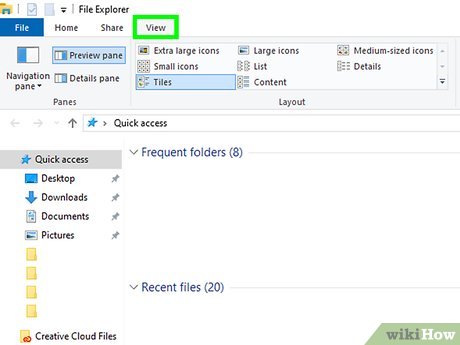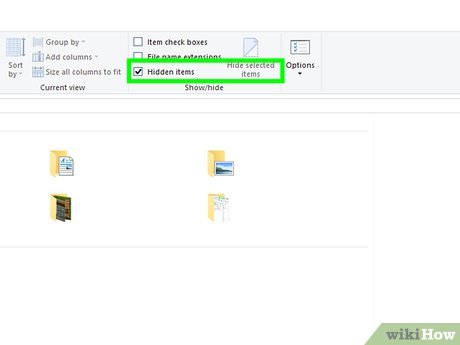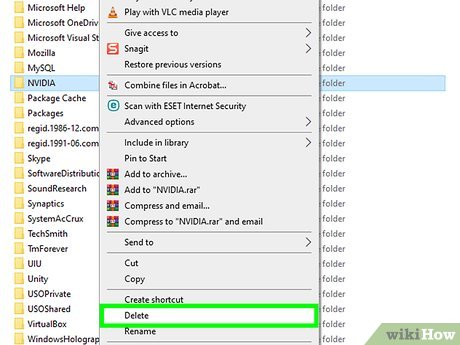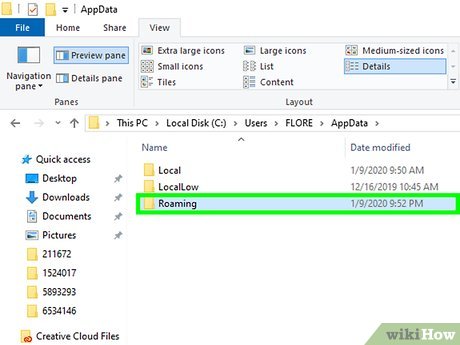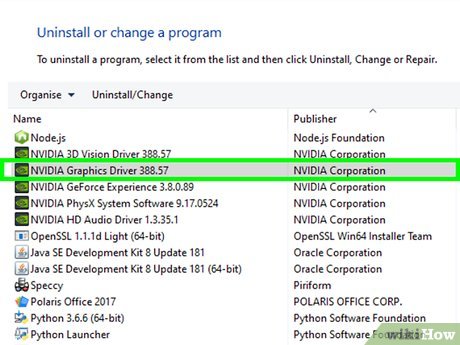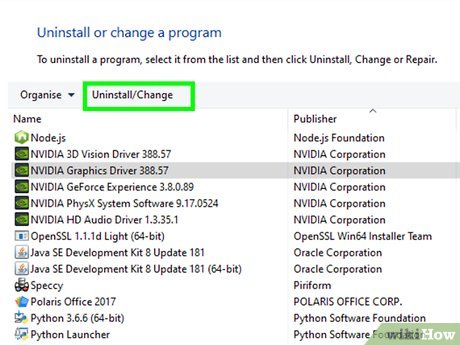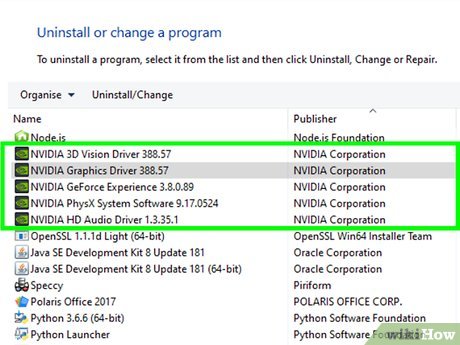How to Uninstall Nvidia Drivers
Part 1 of 3:
Deleting NVIDIA Folders
-
 Open Windows Explorer. It has an icon that resembles a folder with a blue clip. It's in the taskbar at the bottom of the screen.
Open Windows Explorer. It has an icon that resembles a folder with a blue clip. It's in the taskbar at the bottom of the screen.
-
 Click the View tab. It's in the menu bar at the top of the screen.
Click the View tab. It's in the menu bar at the top of the screen. -
 Place a checkmark in the boxnext to "Hidden Items". This will display all files and folders on your computer that are hidden by default, including folders that contain registry keys.
Place a checkmark in the boxnext to "Hidden Items". This will display all files and folders on your computer that are hidden by default, including folders that contain registry keys.
-
 Click This PC. It's in the menu bar to the left next to an icon that resembles a computer screen. This displays all the drives connected to your computer.
Click This PC. It's in the menu bar to the left next to an icon that resembles a computer screen. This displays all the drives connected to your computer. -
 Click the drive that contains your Windows installation. It's next to an icon of a hard drive with the Windows logo over it. This is most likely the C: drive. It may be labeled "OS (C:)", "Local Disk (C:)", "System (C:)" or the name of your computer.
Click the drive that contains your Windows installation. It's next to an icon of a hard drive with the Windows logo over it. This is most likely the C: drive. It may be labeled "OS (C:)", "Local Disk (C:)", "System (C:)" or the name of your computer. -
 Click the NVIDIA folder and press Delete. If you see an NVIDIA folder in your root folder, click it and press the Delete key to remove the folder.
Click the NVIDIA folder and press Delete. If you see an NVIDIA folder in your root folder, click it and press the Delete key to remove the folder. -
 Open the grayed-out folder labeled 'ProgramData.'. It's one of the hidden folders in the root drive.
Open the grayed-out folder labeled 'ProgramData.'. It's one of the hidden folders in the root drive. -
 Delete any NVIDIA folders. Look for any NVIDIA or NVIDIA Corporation folders in the ProgramData folders and click them to select them. Then press the Delete key.
Delete any NVIDIA folders. Look for any NVIDIA or NVIDIA Corporation folders in the ProgramData folders and click them to select them. Then press the Delete key. -
 Click the back arrow to navigate back to the Windows Install (C:) drive. Click the back arrow at the top of Windows Explorer to navigate back to the Windows Install disk.
Click the back arrow to navigate back to the Windows Install (C:) drive. Click the back arrow at the top of Windows Explorer to navigate back to the Windows Install disk. -
 Open the 'Program Files" folder. It's in the Windows install (C:) drive.
Open the 'Program Files" folder. It's in the Windows install (C:) drive. -
 Delete any existing NVIDIA folders. Click any folders from NVIDIA or the NVIDIA Corporation in Program Files and press the "Delete" key. Then navigate back to the Windows Installation drive.
Delete any existing NVIDIA folders. Click any folders from NVIDIA or the NVIDIA Corporation in Program Files and press the "Delete" key. Then navigate back to the Windows Installation drive. -
 Open the 'Program Files (x86)" folder. If you have the 64-bit version of Windows, you will also have a "Program Files (x86)" folder. Click this folder to open it. It's in the Windows install (C:) drive.
Open the 'Program Files (x86)" folder. If you have the 64-bit version of Windows, you will also have a "Program Files (x86)" folder. Click this folder to open it. It's in the Windows install (C:) drive. -
 Delete any existing NVIDIA folders. Click any folders from NVIDIA or the NVIDIA Corporation in Program Files and press the Delete key. Then navigate back to the Windows Installation drive.
Delete any existing NVIDIA folders. Click any folders from NVIDIA or the NVIDIA Corporation in Program Files and press the Delete key. Then navigate back to the Windows Installation drive. -
 Open the 'Users' folder and click on your Windows username folder. The "Users" folder is in the Windows Install Drive. It contains a folder for each Windows user on your machine. Click the folder that has your username.
Open the 'Users' folder and click on your Windows username folder. The "Users" folder is in the Windows Install Drive. It contains a folder for each Windows user on your machine. Click the folder that has your username. -
 Open the 'AppData' folder. It's in the Users folder.
Open the 'AppData' folder. It's in the Users folder. -
 Open the "Local" folder. It's in the AppData folder.
Open the "Local" folder. It's in the AppData folder. -
 Delete any NVIDIA folders. Click any folders from NVIDIA or the NVIDIA Corporation and press the Delete key.
Delete any NVIDIA folders. Click any folders from NVIDIA or the NVIDIA Corporation and press the Delete key. -
 Click the back arrow. It's at the top of the Windows Explorer window. This navigates back to the AppData folder.
Click the back arrow. It's at the top of the Windows Explorer window. This navigates back to the AppData folder. -
 Open the 'Roaming' folder. It's in the AppData folder.
Open the 'Roaming' folder. It's in the AppData folder. -
 Delete any NVIDIA folders. Click any folders from NVIDIA or the NVIDIA Corporation and click them. Then press the Delete key to remove the folders.
Delete any NVIDIA folders. Click any folders from NVIDIA or the NVIDIA Corporation and click them. Then press the Delete key to remove the folders.
Part 2 of 3:
Uninstalling NVIDIA Drivers
-
 Open the Control Panel and click Uninstall a program. It's below "Programs" in the Control Panel. A complete list of all programs and applications installed on your computer will display on-screen.
Open the Control Panel and click Uninstall a program. It's below "Programs" in the Control Panel. A complete list of all programs and applications installed on your computer will display on-screen.- If you are using Windows 8, right-click the Start menu and click Programs and Features.[1]
-
 Scroll down and click NVIDIA graphics driver. All programs are listed in alphabetical order in the Programs and Features page. "NVIDIA graphics driver" is the main component.
Scroll down and click NVIDIA graphics driver. All programs are listed in alphabetical order in the Programs and Features page. "NVIDIA graphics driver" is the main component. -
 Click Uninstall/Change. It's the second tab at the top of the software list. This opens the NVIDIA uninstall program
Click Uninstall/Change. It's the second tab at the top of the software list. This opens the NVIDIA uninstall program -
 Click Uninstall. This uninstalls the NVIDIA component.
Click Uninstall. This uninstalls the NVIDIA component.- Your screen may turn black a couple of times while uninstalling. Don't worry, this is normal.
-
 Click Restart Now. When you are finished uninstalling your graphics driver, your computer will need to restart. Go ahead and do that now.[2]
Click Restart Now. When you are finished uninstalling your graphics driver, your computer will need to restart. Go ahead and do that now.[2] -
 Open the Control Panel. Use the following steps to open the Control Panel:
Open the Control Panel. Use the following steps to open the Control Panel:- Click the Windows Start menu in the lower-left corner.
- Type Control Panel.
- Click Control Panel in the list of search results.
-
 Click Uninstall a program. It's below "Programs" in the Control Panel. This opens the Programs and Features list.
Click Uninstall a program. It's below "Programs" in the Control Panel. This opens the Programs and Features list. -
 Uninstall any remaining NVIDIA components. There are likely some additional NVIDIA components still remaining. These include, "NVIDIA GeForce Experience", "NVIDIA PhysX System Software", "NVIDIA 3D Vision Controller", ect. Click one of these components and click Uninstall/Change. Follow the instructions to uninstall the component. Repeat for each NVIDIA component in the Programs and Features list.
Uninstall any remaining NVIDIA components. There are likely some additional NVIDIA components still remaining. These include, "NVIDIA GeForce Experience", "NVIDIA PhysX System Software", "NVIDIA 3D Vision Controller", ect. Click one of these components and click Uninstall/Change. Follow the instructions to uninstall the component. Repeat for each NVIDIA component in the Programs and Features list.- If asked to restart your computer, go ahead and do so.
Part 3 of 3:
Deleting NVIDIA Registry Keys (Advanced Users Only)
-
 Click on the Start menu. It's the icon with the Windows logo in the Windows taskbar
Click on the Start menu. It's the icon with the Windows logo in the Windows taskbar
-
 Type regedit. This displays the Registry Editor at the top of the Windows Start menu.
Type regedit. This displays the Registry Editor at the top of the Windows Start menu.- WARNING: Deleting items from the Registry can cause permanent damage to your operating system. Proceed at your own risk!
-
 Click regedit. This will open the Registry Editor window.
Click regedit. This will open the Registry Editor window. -
 Click the arrow next to "HKEY_CURRENT_USER". It's to the left of the folder in the sidebar to the left. This displays all folders in the "HKEY_CURRENT_USER" folder.
Click the arrow next to "HKEY_CURRENT_USER". It's to the left of the folder in the sidebar to the left. This displays all folders in the "HKEY_CURRENT_USER" folder. -
 Click the arrow next to the "Software" folder. The software folder is listed below "HKEY_CURRENT_USER" in the sidebar to the left.
Click the arrow next to the "Software" folder. The software folder is listed below "HKEY_CURRENT_USER" in the sidebar to the left. -
 Delete any existing 'NVIDIA' folders. Look for any NVIDIA or NVIDIA Corporation folders in the sidebar to the left. Click on them and then press the Delete key.
Delete any existing 'NVIDIA' folders. Look for any NVIDIA or NVIDIA Corporation folders in the sidebar to the left. Click on them and then press the Delete key. -
 Click the arrow next to the 'HKEY_USERS. folder. It's to the left of the "HKEY_USERS" folder to the left. This folder contains a number of additional registry folders, including a '.DEFAULT' folder and several other folders with numerical titles.
Click the arrow next to the 'HKEY_USERS. folder. It's to the left of the "HKEY_USERS" folder to the left. This folder contains a number of additional registry folders, including a '.DEFAULT' folder and several other folders with numerical titles. -
 Click the arrow next to the DEFAULT folder. It's the first folder under 'HKEY_USERS" folder in the sidebar to the left. The arrow is to the left of the folder in the sidebar.
Click the arrow next to the DEFAULT folder. It's the first folder under 'HKEY_USERS" folder in the sidebar to the left. The arrow is to the left of the folder in the sidebar. -
 Click the arrow next to the 'Software' folder. It's in the ".DEFAULT" folder.
Click the arrow next to the 'Software' folder. It's in the ".DEFAULT" folder. -
 Delete any existing NVIDIA folders. Look for any folders from NVIDIA or the NVIDIA Corporation and click them. Then press the Delete key.
Delete any existing NVIDIA folders. Look for any folders from NVIDIA or the NVIDIA Corporation and click them. Then press the Delete key. -
 Repeat for any additional folders under "HKEY_USERS" folder. Click the arrow, and then the "Software" folder under any other folders in the "HKEY_USERS" folder. Then delete any NVIDIA or NVIDIA Corporation folders in these folders.
Repeat for any additional folders under "HKEY_USERS" folder. Click the arrow, and then the "Software" folder under any other folders in the "HKEY_USERS" folder. Then delete any NVIDIA or NVIDIA Corporation folders in these folders. -
 Restart your computer after you've deleted all Nvidia folders. All existing NVIDIA drivers will now be completely removed from your Windows registry.[3]
Restart your computer after you've deleted all Nvidia folders. All existing NVIDIA drivers will now be completely removed from your Windows registry.[3]
Share by
Isabella Humphrey
Update 05 March 2020


